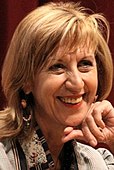| |||||||||||||||||||||||||||||||||
998 delegates in the federal congress Plurality of delegates needed to win | |||||||||||||||||||||||||||||||||
|---|---|---|---|---|---|---|---|---|---|---|---|---|---|---|---|---|---|---|---|---|---|---|---|---|---|---|---|---|---|---|---|---|---|
| Turnout | 995 (99.7%) (secretary) 964 (96.6%) (executive) | ||||||||||||||||||||||||||||||||
| |||||||||||||||||||||||||||||||||
| |||||||||||||||||||||||||||||||||
The 35th Federal Congress of the Spanish Socialist Workers' Party was held in Madrid from 21 to 23 July 2000 to renovate the governing bodies of the Spanish Socialist Workers' Party (PSOE) and establish the party's main lines of action and strategy for the next leadership term. It was held after the party's defeat in the 2000 general election and the subsequent resignation of then secretary-general Joaquín Almunia.
Under a plurality voting system, José Luis Rodríguez Zapatero unexpectedly won the party leadership with 41.6% of the delegate vote (414 votes), to president of Castilla–La Mancha and initial favourite José Bono's 40.7% (405 votes). Former social affairs minister Matilde Fernández secured 11.0% (109 votes), whereas the leader of the PSOE group in the European Parliament, Rosa Díez, obtained 6.5% (65 votes).[1][2] Zapatero would subsequently win the 2004 Spanish general election and become prime minister of Spain in April 2004, a post he would held until 2011.
- ^ "Comienza el cambio tranquilo". PSOE (in Spanish). Retrieved 5 February 2012.
- ^ "Partido Socialista Obrero Español. Partit dels Socialistes de Catalunya, P.Socialista de Euskadi E.E., Partido Socialista Popular, PSOE histórico". Historia Electoral.com (in Spanish). Retrieved 16 March 2023.




